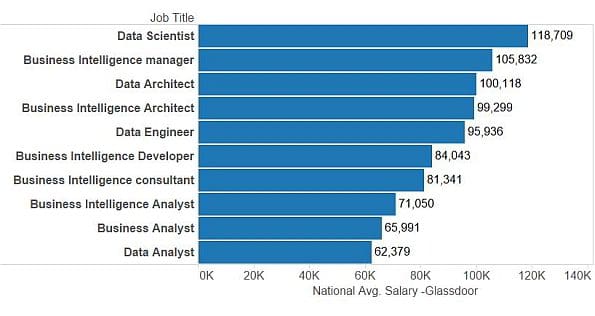The world of data is exploding. Every click, every purchase, every interaction generates a data point, painting a complex tapestry of consumer behavior, market trends, and business performance. Unraveling this tapestry is the domain of Business Intelligence (BI) Data Analysts, the linchpins driving data-driven decision making across industries.

As we hurtle towards 2025, the demand for these critical roles is only expected to surge, powered by the rapid growth of big data, the increasing adoption of AI and machine learning, and the evolving needs of businesses seeking a competitive edge. But what does this mean for the salary landscape of BI Data Analysts in 2025?
Factors Shaping Salary Trends
Several factors will collectively influence the compensation packages of BI Data Analysts in 2025:
1. Rising Demand & Skill Scarcity:
The constant influx of data and the evolving analytical tools necessitate a skilled workforce. Organizations are increasingly recognizing the value of data-driven insights, leading to a higher demand for BI Data Analysts who can translate raw data into actionable intelligence. This imbalance between demand and supply will undoubtedly contribute to competitive salaries.
2. Specialization & Advanced Skills:
The field of BI is becoming increasingly specialized. Analysts with niche skills, such as expertise in cloud computing, data visualization, predictive modeling, or specific industry knowledge, will be highly sought-after and command premium salaries.
3. Location & Experience:
As with most professions, salary expectations vary based on geographical location and years of experience. Major tech hubs and financial centers often offer higher salaries due to the concentration of data-driven businesses. Similarly, seasoned analysts with a proven track record will naturally earn more than entry-level professionals.
4. Industry & Company Size:
Certain industries, such as finance, healthcare, and technology, heavily rely on data analytics and are known to offer competitive salaries. Large corporations with extensive data infrastructure often pay more than smaller businesses.
5. Innovation & Technological Advancement:
The rapid pace of technological innovation in areas like artificial intelligence and machine learning will disrupt the job market, creating new roles and demanding updated skill sets. BI Data Analysts who embrace these advancements and upskill accordingly will be well-positioned for higher earning potential.
Projected Salary Range for 2025:
While precise salary projections are challenging, considering the aforementioned factors, the average salary for a BI Data Analyst in 2025 is estimated to be in the range of $75,000 to $120,000 per year.
However, this range is subject to considerable variation based on individual factors like experience, location, specialization, and industry.
Top Tier Salaries:
Experienced BI Data Analysts with advanced skills in areas like AI, machine learning, predictive modeling, and strong leadership qualities can potentially earn salaries exceeding $150,000 per year.
Entry-Level Salaries:
Starting salaries for entry-level BI Data Analysts, typically those with a bachelor’s degree and some relevant experience, are projected to be in the range of $60,000 to $80,000 per year.
FAQs:
- Q: What skills are essential for a BI Data Analyst in 2025?
- A: In addition to strong analytical and problem-solving skills, proficiency in programming languages like Python or R, data visualization tools (Tableau, Power BI), SQL, cloud computing platforms (AWS, Azure), and understanding of machine learning algorithms will be highly valuable.
- Q: How can I increase my earning potential as a BI Data Analyst?
- A: Staying ahead of the curve by pursuing certifications, developing niche expertise, building a strong portfolio, and actively networking within the industry can significantly enhance your earning potential.
Conclusion:
The future of BI Data Analysts is undeniably bright. As data continues to permeate every aspect of our lives, the demand for skilled professionals who can extract meaningful insights will only intensify. While the salary landscape will be influenced by various factors, the projected figures indicate a promising future for those entering or furthering their careers in this rapidly evolving field. By embracing continuous learning, honing specialized skills, and adapting to technological advancements, BI Data Analysts can position themselves for lucrative and fulfilling careers in the years to come.
Closure
Thus, we hope this article has provided valuable insights into Decoding the Future: Business Intelligence Data Analyst Salaries in 2025. We appreciate your attention to our article. See you in our next article!


